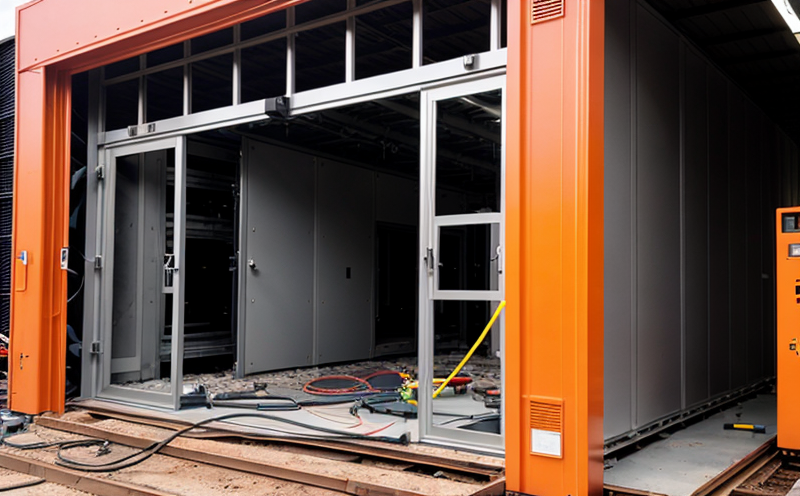JIS C8715 Thermal Management and Safety Testing of Lithium-Ion Batteries for Portable Equipment
The JIS C8715 standard is a crucial guideline that ensures the thermal safety, reliability, and performance of lithium-ion batteries used in portable equipment. This standard is part of Japan's stringent quality control framework aimed at protecting both consumers and manufacturers from potential hazards associated with battery malfunctions.
Lithium-ion batteries are integral to modern portable electronic devices such as smartphones, laptops, and wearable tech. These batteries must be designed, manufactured, and tested under strict conditions to ensure they can withstand various environmental stresses without compromising safety or performance. The JIS C8715 standard provides a robust framework for conducting thermal management and safety tests that help manufacturers meet these stringent requirements.
The testing process outlined in JIS C8715 is designed to simulate real-world scenarios where batteries are exposed to extreme temperatures, overcharging, short circuits, mechanical abuse, and other potential hazards. By subjecting lithium-ion batteries to controlled thermal stresses, the standard helps identify any vulnerabilities that could lead to overheating or thermal runaway events.
The primary goal of JIS C8715 is to ensure that portable equipment manufacturers can provide safe, reliable products. Compliance with this standard not only ensures product safety but also enhances consumer confidence and brand reputation. Additionally, meeting the requirements of JIS C8715 opens doors for international markets where stringent quality standards are enforced.
The testing process involves several critical steps designed to evaluate various aspects of lithium-ion battery performance. These include:
- Thermal cycling: This step simulates the temperature variations that a battery might encounter during its lifecycle, from extreme cold to hot conditions.
- Overcharge test: To ensure that batteries can safely handle extended periods of overcharging without damage or risk.
- Short circuit test: Evaluates how well a battery responds in case of accidental short circuits and ensures it does not pose a safety hazard.
- Mechanical abuse tests: These tests simulate various physical stresses, such as punctures, drops, and vibrations, to assess the durability and integrity of the batteries under real-world conditions.
The detailed testing procedures outlined in JIS C8715 are essential for ensuring that lithium-ion batteries meet the highest safety standards. Compliance with this standard demonstrates a commitment to quality and reliability, which is critical for maintaining consumer trust and meeting regulatory requirements.
Manufacturers who adhere to JIS C8715 not only enhance their product's safety but also position themselves favorably in competitive markets where stringent quality control is paramount. By investing in robust testing processes aligned with this standard, companies can ensure that their products are safe, reliable, and capable of performing optimally under a wide range of conditions.
Eurolab Advantages
At Eurolab, we pride ourselves on offering comprehensive solutions for all your testing needs. Our expertise in JIS C8715 compliance ensures that you receive accurate and reliable results to support your product development and quality assurance processes.
- State-of-the-art facilities: Equipped with the latest equipment, our labs provide precise and repeatable test results.
- Experienced professionals: Our team of seasoned engineers and technicians ensures that every test is conducted with precision and care.
- Comprehensive services: From initial consultation to final reporting, we offer a seamless testing experience tailored to your specific requirements.
- Fast turnaround times: We understand the importance of timely results and strive to deliver accurate reports within days rather than weeks.
We are committed to providing you with the highest level of service, ensuring that your products meet not only JIS C8715 standards but also exceed them. Our goal is to help you achieve compliance while maintaining product quality and performance. Let us assist you in navigating the complexities of JIS C8715 testing.
Frequently Asked Questions
Customer Impact and Satisfaction
Ensuring compliance with JIS C8715 is not just about meeting regulatory requirements; it's also a significant step towards enhancing customer satisfaction. By adhering to these stringent standards, manufacturers can deliver products that are safe, reliable, and capable of performing optimally under various conditions.
- Increased market access: Compliance with JIS C8715 opens doors to Japanese and other international markets where strict quality controls are enforced.
- Better brand reputation: Meeting these standards helps manufacturers build a strong, trustworthy brand image among consumers.
- Improved product performance: The rigorous testing process ensures that batteries perform reliably under real-world conditions.
- Potential for innovation: By adhering to high standards, companies can focus on innovative features and advanced technologies without compromising safety.
Customers benefit from products that are not only safe but also efficient and long-lasting. This translates into increased customer satisfaction and loyalty. Manufacturers who comply with JIS C8715 can expect higher sales figures and better market positioning as they demonstrate a commitment to quality and safety.
International Acceptance and Recognition
The JIS C8715 standard is widely recognized in Japan and other parts of the world for its stringent requirements. Compliance with this standard is not only beneficial for Japanese manufacturers but also for international companies looking to enter the Japanese market or comply with global standards.
- Japan: JIS C8715 compliance ensures that products meet strict safety and quality standards in Japan, one of the world's largest consumer electronics markets.
- International markets: Meeting these standards can enhance a company's reputation and help it gain entry into other international markets with similar regulatory requirements.
The global acceptance of JIS C8715 highlights its importance in ensuring that lithium-ion batteries are safe, reliable, and capable of performing optimally under various conditions. This recognition underscores the significance of adhering to this standard for manufacturers aiming to compete on a global scale.





